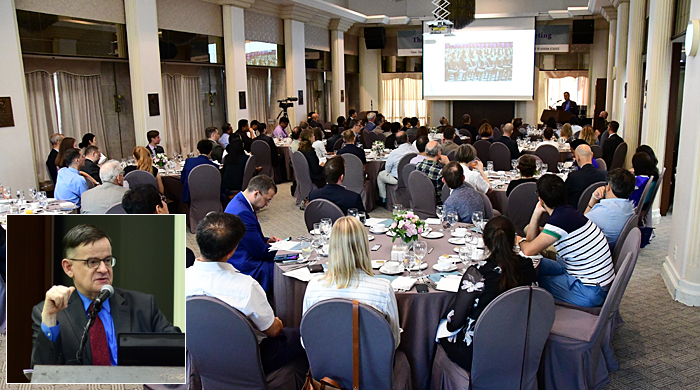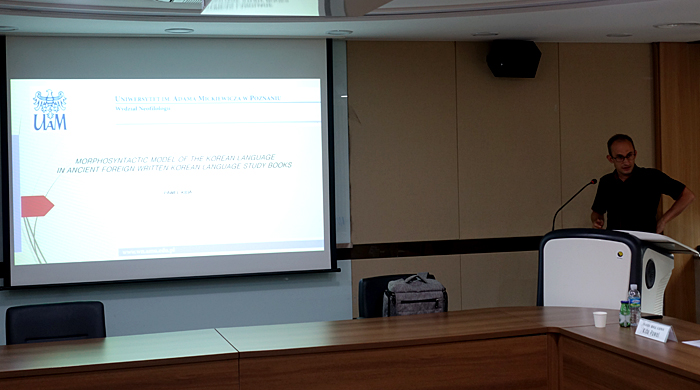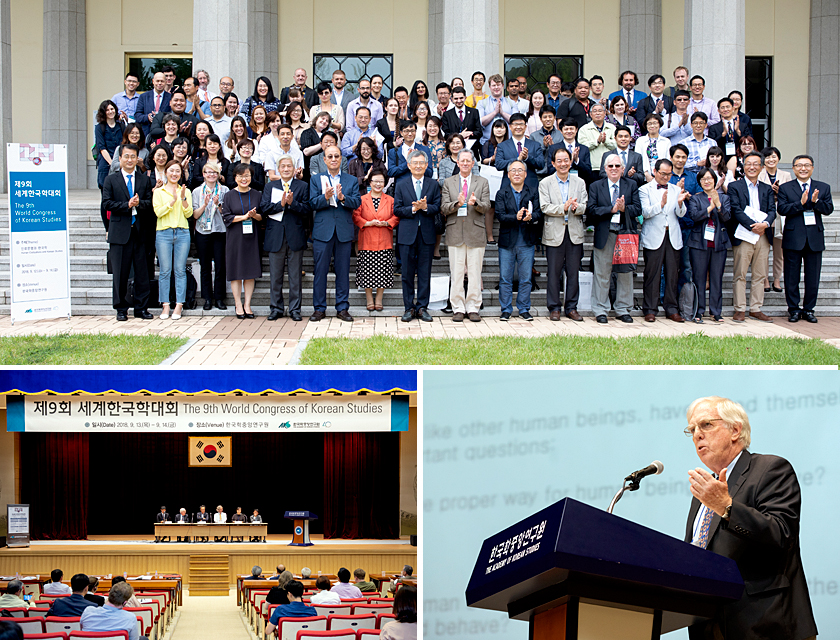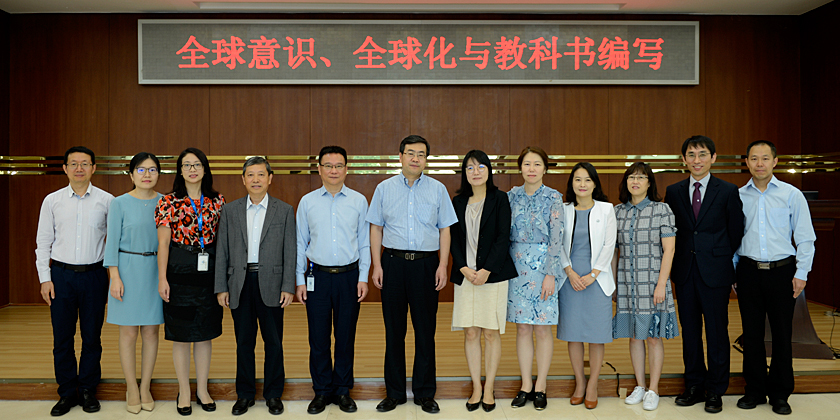CEFIA News
● The 75th Societas Koreana Lecture Meeting
● The 155th Colloquium on Korean Studies Abroad
● The The 9th World Congress of Korean Studies
● The 2018 Academy of Korean Studies & The People's Education Press Textbook Seminar
● The 155th Colloquium on Korean Studies Abroad
● The The 9th World Congress of Korean Studies
● The 2018 Academy of Korean Studies & The People's Education Press Textbook Seminar
The 75th Societas Koreana Lecture Meeting

At 17:30, September 5, 2018, the 75th Societas Koreana Lecture Meeting was held in the Press Club of the Press Center in Seoul. Around eighty five foreign opinion leaders living in Korea, including foreign officials and researchers, attended the conference to listen to the lecture delivered by Professor Andrei Lankov (Kookmin University) titled "Making Money out of State: the Pseudo-State Enterprises in North Korean Economy".
Through the lecture, Professor Andrei Lankov introduced the development of North Korean market economy. He explained how the North Korean regime falsely registered and managed private corporations as pseudo-state enterprises as the market economy recovered. Professor Lankov vividly described the capitalistic aspect of North Korea, by sharing with the audience actual episodes of North Korean businessmen, the construction boom, and the status of the growing service industry. The lecture provided the participants with a chance to learn about the market economy in North Korea, which had been merely viewed as the last-surviving Stalinist state.
Through the lecture, Professor Andrei Lankov introduced the development of North Korean market economy. He explained how the North Korean regime falsely registered and managed private corporations as pseudo-state enterprises as the market economy recovered. Professor Lankov vividly described the capitalistic aspect of North Korea, by sharing with the audience actual episodes of North Korean businessmen, the construction boom, and the status of the growing service industry. The lecture provided the participants with a chance to learn about the market economy in North Korea, which had been merely viewed as the last-surviving Stalinist state.
The 155th Colloquium on Korean Studies Abroad

The 155th Colloquium on Korean Studies Abroad was held at the conference room in 2F Munhyeonggwan, the Academy of Korean Studies at 2pm on September 7, 2018.
Pawel Kida gave a presentation on the subject "Morphosyntactic Model of the Korean Language in Ancient Foreign-written Korean Language Study Books. The presenter Pawel Kida analyzed the grammar of the early Korean language through the research made on Korean language books written by Western scholars between the late 19th century and 20th century. He also explained the research made at that time contributed to establishing the grammar of the modern Korean language. Researchers and students graced the occasion with their presence.
Pawel Kida gave a presentation on the subject "Morphosyntactic Model of the Korean Language in Ancient Foreign-written Korean Language Study Books. The presenter Pawel Kida analyzed the grammar of the early Korean language through the research made on Korean language books written by Western scholars between the late 19th century and 20th century. He also explained the research made at that time contributed to establishing the grammar of the modern Korean language. Researchers and students graced the occasion with their presence.
The 9th World Congress of Korean Studies

The 9th World Congress of Korean Studies was held at the Academy of Korean Studies for three days from Sep. 12 to 14. Also celebrating the 40th anniversary of the opening of the Academy of Korean Studies, the World Congress was attended by Korean Studies scholars from 25 countries from around the world, who presented 156 theses through 45 panels. The numbers are by far the highest in the congress history.
At the Special Session held during the Opening Ceremony, some of the most eminent scholars in the field of Korean Studies in Korea and abroad, Donald L. Baker (University of British Columbia), Kwon Heon-ik (University of Cambridge), Michael J. Pettid (Binghamton University), Lee Eun-jeong (Free University at Berlin) and Park Tae-gyun (Seoul National University), presented and discussed their theses, under the theme "Human Civilization and Korean Studies."
At the Special Session held during the Opening Ceremony, some of the most eminent scholars in the field of Korean Studies in Korea and abroad, Donald L. Baker (University of British Columbia), Kwon Heon-ik (University of Cambridge), Michael J. Pettid (Binghamton University), Lee Eun-jeong (Free University at Berlin) and Park Tae-gyun (Seoul National University), presented and discussed their theses, under the theme "Human Civilization and Korean Studies."

The Congress this year included one presenter from Africa and six from South America, because special support was available to presenters in South America and Africa, the region considered as weak spots in Korean Studies. Certainly, the hot topic in Korean Studies in South America was Korean popular culture, or popularly known as the Korean Wave. Researchers analyzed the Korean Wave in South America through various viewpoints and approaches. In addition to South American presenters, many researchers from other regions also presented theses on the Korean popular culture represented through the Korean Wave. At the Congress, a total of 13 theses were presented under the Popular Culture Panel.
In addition, next-generation Korean Studies scholars (who are graduate students) presented 53 theses on various themes, of which five presenters, including Kim Yeong-yeon (Seoul National University), were given the Next-Generation Scholars of Korean Studies Thesis Award. A number of institutions, including the Publishing Department of the Academy of Korean Studies, European Journal of Korean Studies and S/N Korean Humanities, exhibited books on Korean Studies to promote important contents to scholars from around the world.
The event provided a chance for scholars to seek a direction for Korean Studies, as was participated by the chairpersons of all Korean Studies Societies representing various regions, including International Society for Korean Studies, Association for Korean Studies in Europe, Korean Studies Association of Australasia, and Association of Asian Studies - Committee for Korean Studies. The 9th World Congress of Korean Studies was a place where participants shared results of their research on Korean Studies in the world and confirmed the development of Korean Studies, leaping forward to the next level.
In addition, next-generation Korean Studies scholars (who are graduate students) presented 53 theses on various themes, of which five presenters, including Kim Yeong-yeon (Seoul National University), were given the Next-Generation Scholars of Korean Studies Thesis Award. A number of institutions, including the Publishing Department of the Academy of Korean Studies, European Journal of Korean Studies and S/N Korean Humanities, exhibited books on Korean Studies to promote important contents to scholars from around the world.
The event provided a chance for scholars to seek a direction for Korean Studies, as was participated by the chairpersons of all Korean Studies Societies representing various regions, including International Society for Korean Studies, Association for Korean Studies in Europe, Korean Studies Association of Australasia, and Association of Asian Studies - Committee for Korean Studies. The 9th World Congress of Korean Studies was a place where participants shared results of their research on Korean Studies in the world and confirmed the development of Korean Studies, leaping forward to the next level.
2018 The Academy of Korean Studies & People’s Education Press Textbook Seminar

As part of the "Understanding Korea Project," the Center for International Affairs of the Academy of Korean Studies has regularly organized textbook seminars in collaboration with the People's Education Press. Under the theme "Global Awareness, Globalization and Writing Textbooks," a textbook seminar was held on September 18, 2018 at the headquarters of the People's Education Press.
The opening address delivered by Huang Chiang, the president of the People's Education Press, confirmed the friendly and cooperative relationship that has existed between the two parties since 2003 and its significance. President Huang also discussed his hope of strengthening the friendly cooperation between the two organizations throughout the seminar.
Throughout the seminar presentations and discussions were held on global awareness in relation to three subjects, English, History and Geography Education, and on the writing of textbooks. First, Kim Seong-hye, a member of the Board of Education at the Korea Institute for Curriculum and Evaluation, gave a presentation on the theme, "The Analysis of Global Awareness Presented in English Textbooks in Korea," and discussed understanding of international views on English education as the goal, based on analyses of global awareness presented in the 2015 English education curriculum for English majors. In response, Zhang Xianchen, the English editor at the People's Education Press, made a presentation on the theme, "Editing Middle School English Textbooks based on an International Vision," and discussed how the key culture, which was recently addressed in the educational curriculum of China, was reflected and what the core culture was in the English curricula. In the presentation, he emphasized the characteristics of the middle school English curricula in China under the global environment made the transmission of Chinese culture possible, through the ability to comprehensively utilize the language and cultural confidence among Chinese students in the process of international exchanges.
The opening address delivered by Huang Chiang, the president of the People's Education Press, confirmed the friendly and cooperative relationship that has existed between the two parties since 2003 and its significance. President Huang also discussed his hope of strengthening the friendly cooperation between the two organizations throughout the seminar.
Throughout the seminar presentations and discussions were held on global awareness in relation to three subjects, English, History and Geography Education, and on the writing of textbooks. First, Kim Seong-hye, a member of the Board of Education at the Korea Institute for Curriculum and Evaluation, gave a presentation on the theme, "The Analysis of Global Awareness Presented in English Textbooks in Korea," and discussed understanding of international views on English education as the goal, based on analyses of global awareness presented in the 2015 English education curriculum for English majors. In response, Zhang Xianchen, the English editor at the People's Education Press, made a presentation on the theme, "Editing Middle School English Textbooks based on an International Vision," and discussed how the key culture, which was recently addressed in the educational curriculum of China, was reflected and what the core culture was in the English curricula. In the presentation, he emphasized the characteristics of the middle school English curricula in China under the global environment made the transmission of Chinese culture possible, through the ability to comprehensively utilize the language and cultural confidence among Chinese students in the process of international exchanges.

Next, on the subject of history education, Yun Se-byeong, the history teacher at Yuseong Bio Science Technology High School gave a presentation on the theme, "How Should twentieth-century World History be composed?" and examined the methods in which twentieth-century world history textbooks have approached the contemporary issue, and sought directions for new methods of composition reflecting the research results on twentieth-century world history. To this, Ma Shuhui, the history editor at the People's Education Press gave a presentation under the theme, "World History Textbooks and the Formation of Global Awareness." While focusing on world history textbooks dating from the late Qing dynasty, which are considered the first textbook on world history in terms of the modern meaning in Chinese history education, the editor Ma Shuhui analyzed the elements that influenced the awareness and influence made by the Chinese people at the time and presented his research on the relationship between world history textbooks and the formation of global awareness.
Lastly, Im Eun-jin, a professor at the Department of Geography Education of Kongju National University, discussed the topic of geography education during her presentation on "The Direction and Contents of Korean Geography Education for Cultivating World Citizenry." Professor Im examined the general arguments on global citizenship education, followed by the relationship between global citizenship education and geography education, and how the field of geography under the Social Affairs Division in the educational curriculum, which was reformed in 2015, dealt with the issue. In response, Pangling, the geography editor at the People's Education Press gave a presentation on "The Establishment of Spatial Views and the Fortification of International Understanding." In secondary school geography education in China, space was the most basic problem in geography; and since geography serves as an important medium for nurturing a global vision among Chinese students and sharpening their understanding of the world, the editor Pangling introduced measures in geography that could have those effects, especially in terms of establishing a spatial view mainly through secondary school geography education textbooks.
Through presentations and general discussions, presenters and researchers in the relevant fields sought ways to write textbooks and discuss global awareness in the two countries. Through the textbook seminar, the two organizations were able to exchange mutually beneficial information on education and general reforms of the educational curricula in Korea and China, and promised to push ahead with their cooperative relationship and academic exchanges.
Lastly, Im Eun-jin, a professor at the Department of Geography Education of Kongju National University, discussed the topic of geography education during her presentation on "The Direction and Contents of Korean Geography Education for Cultivating World Citizenry." Professor Im examined the general arguments on global citizenship education, followed by the relationship between global citizenship education and geography education, and how the field of geography under the Social Affairs Division in the educational curriculum, which was reformed in 2015, dealt with the issue. In response, Pangling, the geography editor at the People's Education Press gave a presentation on "The Establishment of Spatial Views and the Fortification of International Understanding." In secondary school geography education in China, space was the most basic problem in geography; and since geography serves as an important medium for nurturing a global vision among Chinese students and sharpening their understanding of the world, the editor Pangling introduced measures in geography that could have those effects, especially in terms of establishing a spatial view mainly through secondary school geography education textbooks.
Through presentations and general discussions, presenters and researchers in the relevant fields sought ways to write textbooks and discuss global awareness in the two countries. Through the textbook seminar, the two organizations were able to exchange mutually beneficial information on education and general reforms of the educational curricula in Korea and China, and promised to push ahead with their cooperative relationship and academic exchanges.

